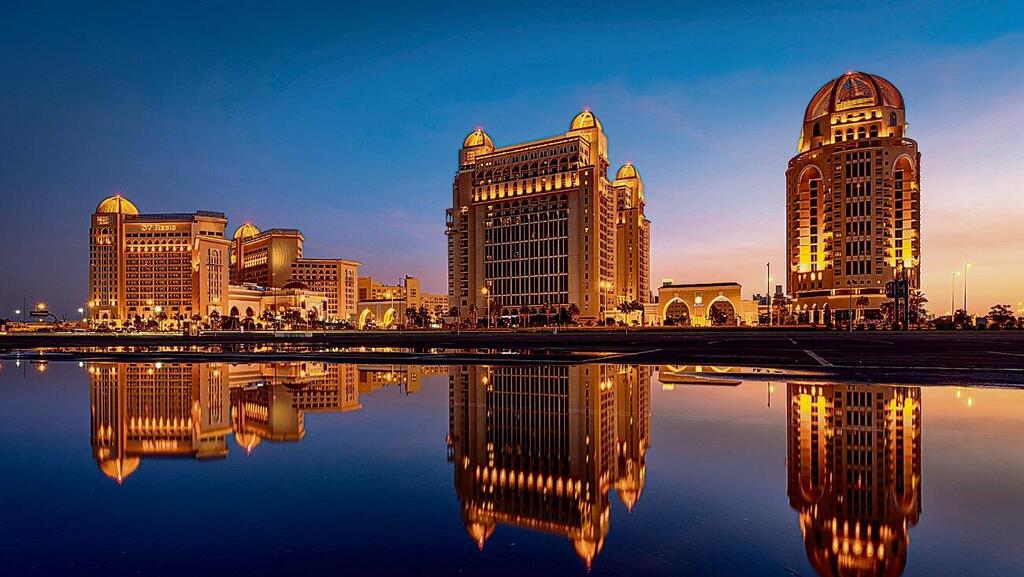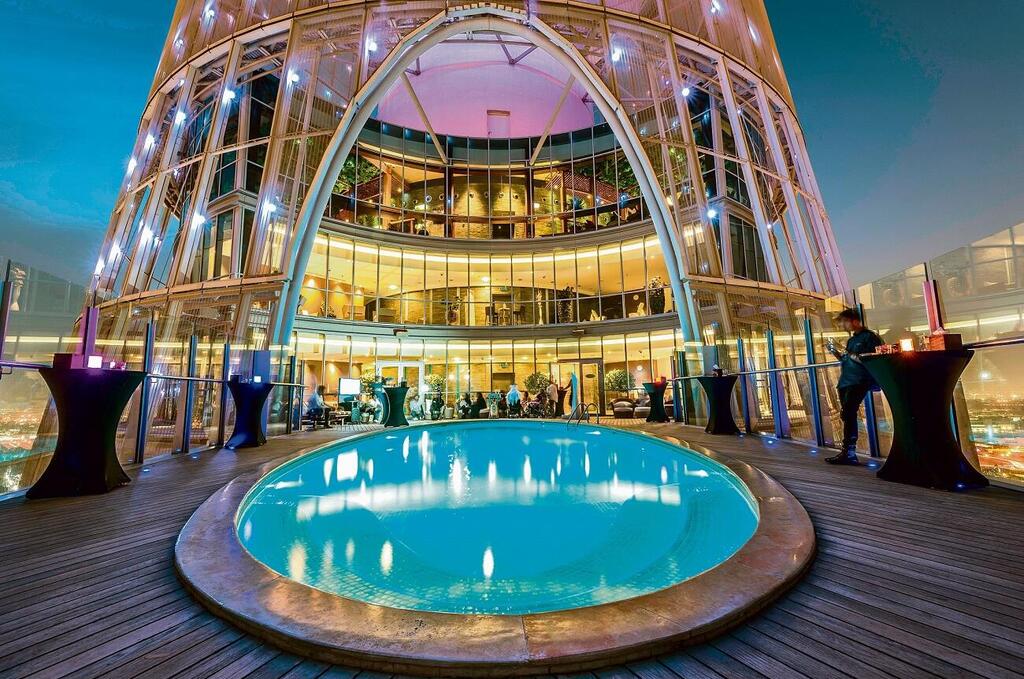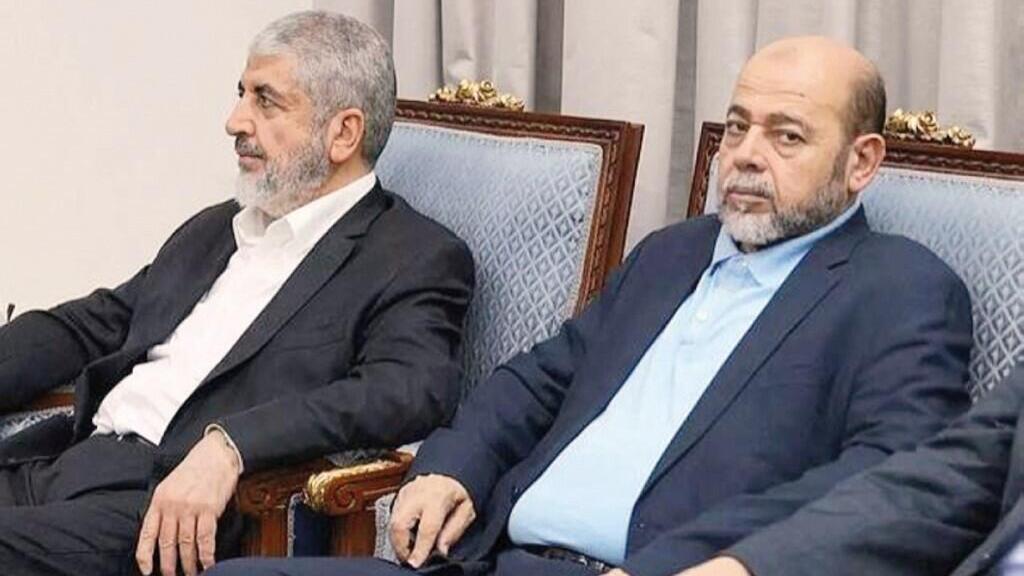Getting your Trinity Audio player ready...
Hussein, nephew of senior Hamas official Mousa Mohammed Abu Marzouk, couldn’t be more excited about the launch of a motor race he organized in Malaysia - a fair distance from Gaza. This was his own personal enterprise, the chance to showcase his hobby and his love for luxury cars. He personally drove a shiny, brand-new silver Audi.
More stories:
Lest anyone accuse the nephew of the deputy chairman of the Hamas political bureau of being more interested in motor racing than the Palestinian cause, Hussein covered the cars with Palestinian flags and red keffiyehs.
7 View gallery
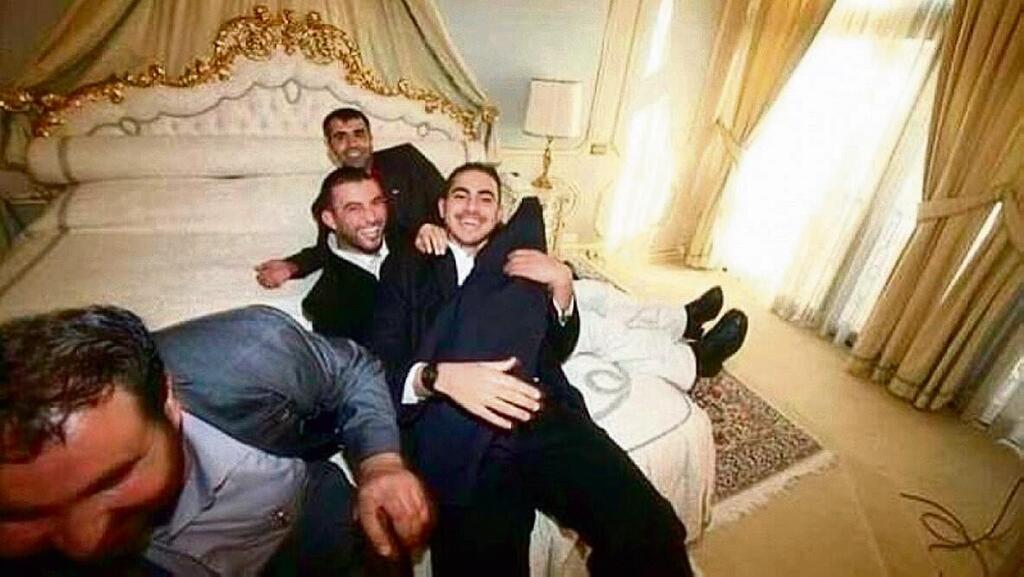

Party boys: Children of Hamas officials at a hotel outside of the Gaza Strip
(Photo: Social media screenshot)
"We want the race to remind everyone of the Palestinian cause and the Palestinian people," sources close to him were quick to claim. Hussein, on the other hand, was quick to press on the gas pedal of his shiny, brand-new sports car.
Hussein’s deep love of deluxe cars and racing them means he spends a lot of time outside of the Gaza Strip, primarily in hotels in Qatar and Malaysia. It's no coincidence that the son of Musa Abu Marzouk’s sister benefits so much from his uncle’s enormous wealth; Hamas senior officials have created a system of advancing their nephews as yet one more way of spreading around their assets and loot so that it’s not all registered in their own names.
Abu Marzouk, deputy chairman of the Hamas political bureau, lives with his family in Qatar. He had lived in the United States for 14 years and was arrested on terrorist charges in 1994, and was extradited two years later. He moved to Jordan, then to Syria, and in 2012 on to Cairo. Despite his arrest, he held on to his vast wealth, that the German Bild newspaper values at over $2 billion. Other sources believe this figure has now soared to over $3 billion.
A few days after the October 7 massacre, Abu Marzouk's brother, Yusuf, was killed in a strike on Rafah. But as the pressure felt so harshly by Gazans was mounting, Hamas leaders and their children carried on living the good life.
Abu Marzouk has five sons and a daughter. Umar – a doctor living in Qatar, Billal – a Qatar restaurateur, Tarek – a businessman, and Mohammed - who lives in Turkey, and living in the U.S are son, Annas, and daughter, Ruba.
7 View gallery
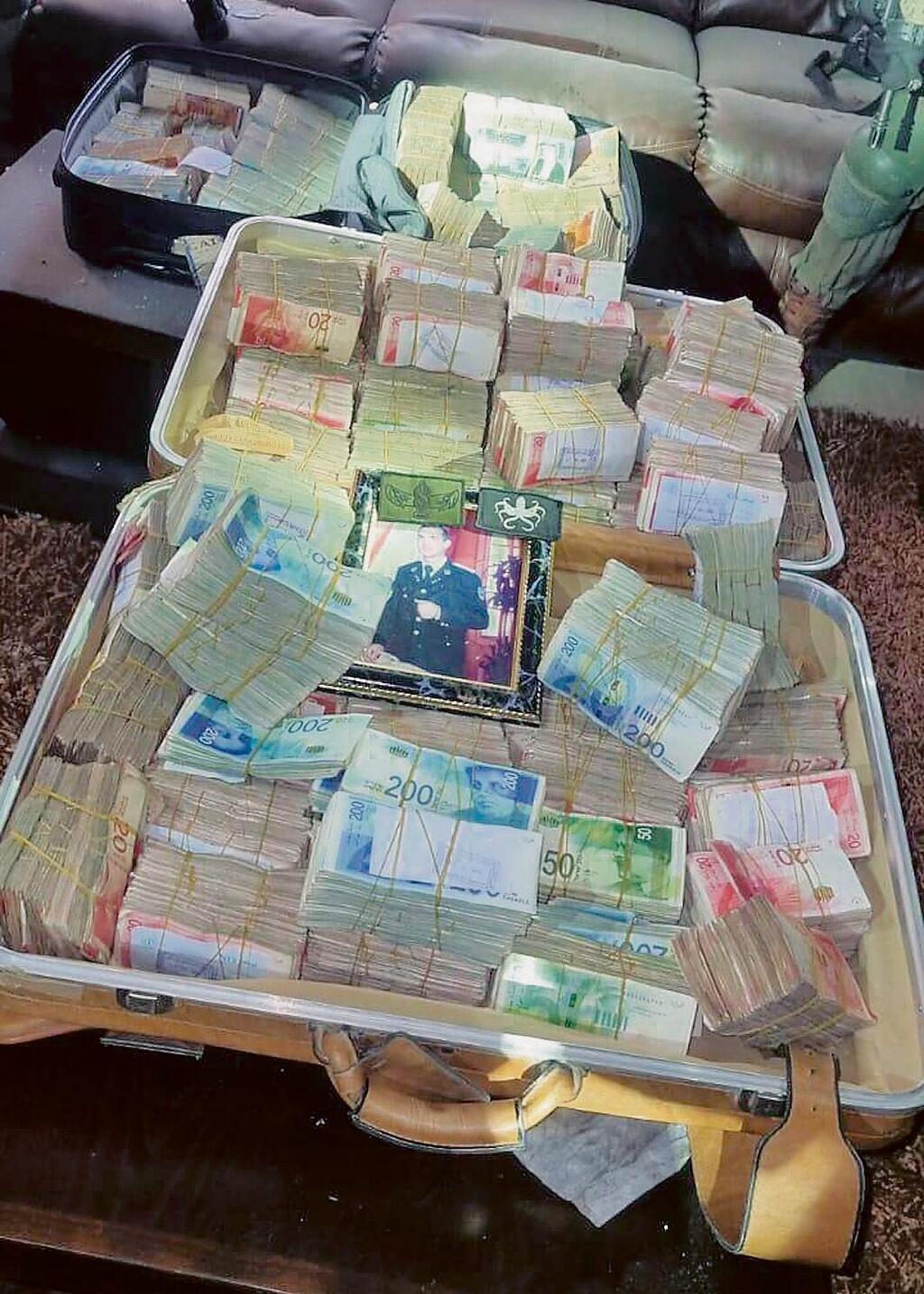

The suitcase of money seized in Gaza at the home of a senior Hamas official
(Photo: IDF Spokesperson's Unit)
Two years ago, Lebanese journalist Maria Maalouf revealed that Abu Marzouk had purchased an opulent villa for his sons in Malaysia. “Hamas’s most prominent leader, Mousa Abu Marzouk, deputy chairman of the Hamas political bureau, just purchased a luxury home in Malaysia. This is the man who is stealing and looting while the world watches us liberating Jerusalem and while attacking Saudi Arabia and the Emirates.”
This was not the only criticism of the Abu Marzouk’s family lifestyle, which is as far removed from Gaza as Khan Younis is from Malaysia. When another of Abu Marzouk’s sons, Tarek, uploaded a story mocking Qatari officials after they refused to allow him to enter government offices wearing shorts, a Gazan activist responded: “He’s telling us a funny story about something that happened to him in Qatar, where the leadership set themselves up years ago to conduct a Jihad and liberate Palestine from its various hotels. The video just shows his indifference to our suffering and our appalling living conditions here in Gaza – as he and his friends are enjoying a luxurious life at our expense.”
There are an estimated 1,200 millionaires in Gaza. Senior members of Hamas, their children and relatives (nephews, cousins, friends and acquaintances) have the Big Money. They own property that approach the size and value of palaces, as well as cash that keeps them in racing cars and other luxuries.
Their good life, in sharp contrast to that of Gazans, is an open secret. For years, intelligence sources have been reporting that Hamas leaders and their families have been enjoying their portly bank accounts. During the course of this war, the IDF has exposed just how far removed the leadership was from Gaza’s residents.
Troops operating in Gaza recently found two suitcases containing five million shekels in cash in the home of a Hamas leader in Jabaliya. This is a vast sum, equal to all the money seized in the Gaza Strip during the entire first month of the war. There were piles upon piles of wads of colorful banknotes – mainly Israeli shekels. The IDF did not identify the Hamas leader in whose home the cases were found, but in other cases, banknotes have pointed to a very particular purse.
The IDF has further exposed receipts and documents attesting to the purchase of expensive jewelry valued at thousands of dollars. The customer was Mu’ad, one of 13 children born to Ismail Haniyeh, chairman of Hamas’s political bureau, who is estimated to be the richest among the group's upper echelon.
Mu’ad and his brother, Abed a-Salem, are often spotted hanging out in five-star hotels in Doha and Istanbul. Mu’ad is especially fond of the dolce vita – as is evident from the jewelry he bought in stores in Gaza and Qatar.
7 View gallery
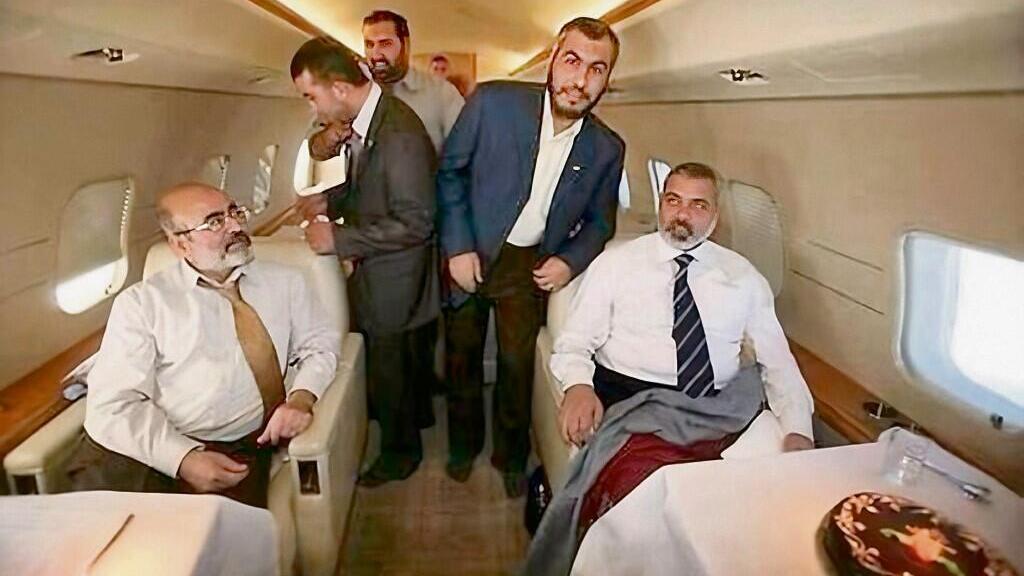

Ismail Haniyeh and other senior Hamas officials in their private plane
(Photo: Screenshot from social media)
The seized receipts were inspected by military intelligence. The amount on a single receipt was equal to almost two years’ pay for the average Gazan.
Haniyeh Jr., whose signature appears on the receipts, spends a great deal of time flying between Gaza and Turkey, which he can easily do with his Turkish passport, another perk that was given to, and enjoyed by the son of a prominent father.
Buying jewelry is just one of his hobbies. The other is investing in real estate. He has invested in houses and buildings in Turkey, and also owns a number of high-end apartments, villas and entire buildings in various areas across the Gaza Strip, although they have recently undergone a transformation courtesy of the IDF offensive. Three of Haniyeh's homes in Gaza were reportedly bombed.
The Saudi Arabian Elaph newspaper published an unflattering article about him under the headline “Mu’ad Haniyeh – A Life of Extravagance, Alcohol and Women.” This scathing report did not seem to have bothered him much, nor has it prompted him to change any of his ways.
7 View gallery
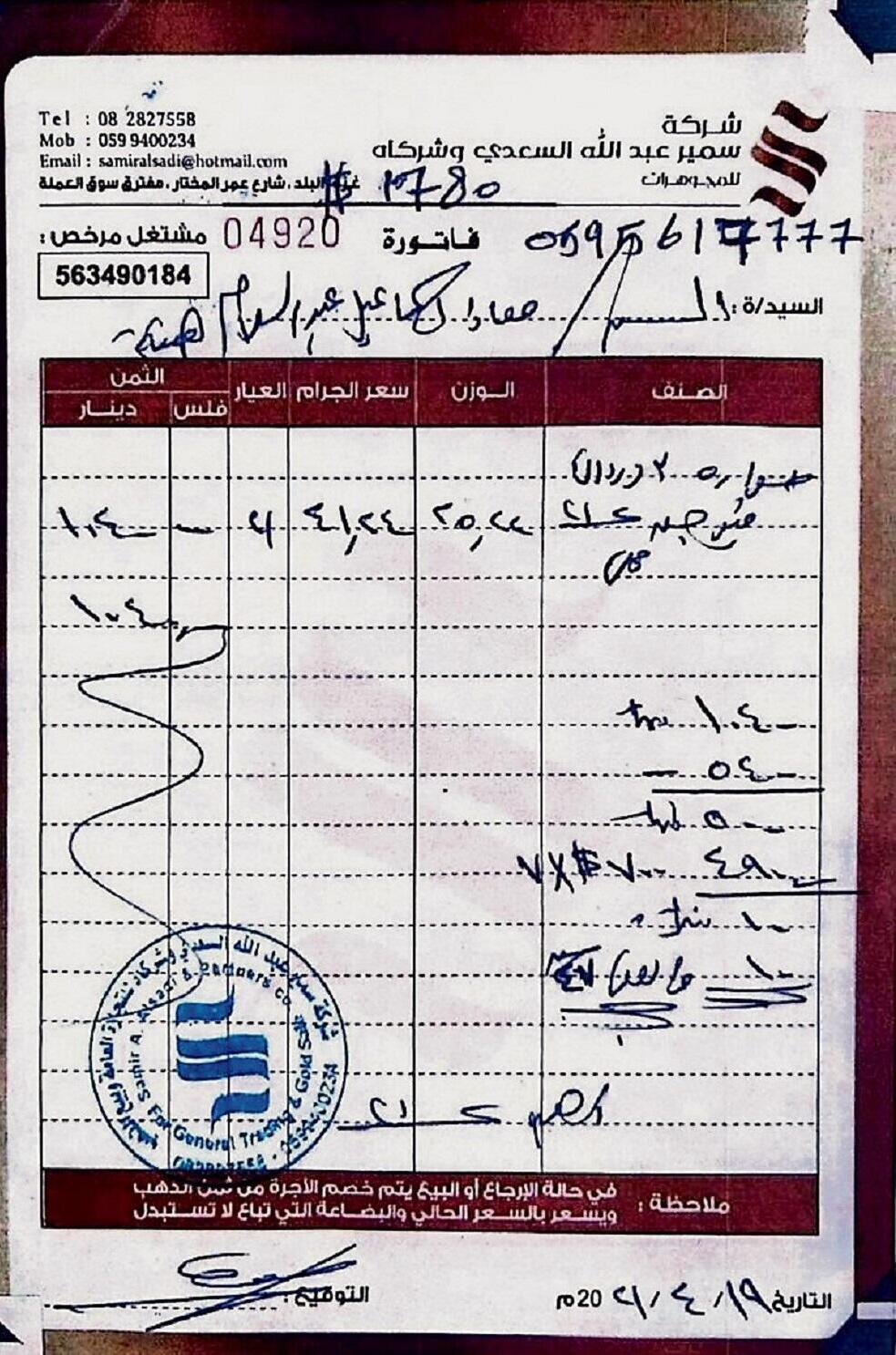

Receipt for thousands of dollars of jewelry purchased by Mu’ad Haniyeh
(Photo: IDF Spokesperson's Unit)
Haniyeh’s sons are widely regarded as boozing party-people, invariably seen having a good time in glitzy clubs with women who are not their wives. This stands in sharp contrast to the conservative, traditional agenda that Haniyeh tries to portray to the world as a leader of an Islamist organization.
According to a “knowledgeable Palestinian source,” the Haniyeh brothers also have power generators they are given for free, that they sell to Gazans. They get their business acumen from their father who lives in hotels in Qatar and Turkey and flies around on private jets between Tehran, Istanbul, Moscow and Cairo. His personal wealth is estimated at $2.5 billion by Bild and $3.2 billion by the Israeli Embassy in Washington. Further estimates exceed $4 billion.
He registers his assets in the names of his sister’s sons whose company owns more than 13 buildings and apartments as well as land in Gaza, some valued at 4 million dollars as well as entire areas in the center of the Strip.
Palestinian reports claim Haniyeh also owns an electric goods and technology company, a jewelry store, vacation rentals, a concrete production plant, rock quarries and even stretches of the Gaza Strip shore.
But of all the Hamas nepo-babies, the real party-boy is Muhammed - son of Ghazi Hamad, a member of Hamas’ political bureau who has been living in Qatar since last August. Hamad is regarded as pragmatic and served as Hamas’s mediator for the Gilad Shalit deal.
There is no exact estimate for his net worth, but he certainly doesn’t hold back when it comes to treating himself and his children to the excessive lifestyle. His son, Mohammed, has always been a good-time boy. For his 20th birthday, he put on an extravaganza in Doha with invited guests, plenty of food and drink, while music and dancing provided entertainment.
He's very active on his Instagram account where followers can keep track of his world travels, meticulous fashion styles including high end suits and ties, as well as his favorite hobby, horseback riding.
Muhammed makes sure to pamper his friends with his family's money. He flies them to Sharm El-Sheikh in Sinai, puts them up in five-star hotels and covers all their entertainment expenses in neighboring Dahab.
“Ghazi Hamad serves as minister of welfare in Gaza’s Hamas government. Accordingly, his son is spending the money of Gaza's poor for his friends to enjoy excess and extravagance,” raged one Gazan political analyst, Hussein Jamal. He then turned his ire on Yahya Sinwar, who turns a blind eye to the overindulgent lifestyles of the children of his group's leaders. “Will Sinwar, as usual, whitewash Ghazi’s son’s Instagram account with a fake commission of enquiry or will this kind of corruption just remain a secret?”
Khaled Mashal, who served as head of Hamas’ political bureau for 21 years and was one of its founders, also never gets those worrisome calls from the bank. Like Haniyeh, he lives mainly in Qatar, and sometimes in Istanbul. Bild reports that when he left Syria where he had lived for an extended period, he took with him $1.5 billion from Hamas’ Damascus office. Israel estimates his net worth at somewhere between $4 billion and $5 billion.
Mashal has three daughters and four sons. He’s known as Abu El Walid, after his eldest son, Walid – a businessman who studied chemistry, but seems to relish the family fortune more than the laboratory. Mashal’s daughters have also made careers for themselves: Fatma is a computer engineer; Hiba is an information systems manager; and Nur is a dentist. The other sons are Omar, Billal and Yahya – a 12th grade student who is said to be most like his father.
The aforementioned Walid got married 13 years ago in a lavish venue in Damascus. Hundreds of guests arrived, including the rich and powerful of Lebanon, Syria, Jordan, the West Bank and Qatar. Among the guests was Egyptian sheikh Yusuf al-Qaradawi, who was a prominent Muslim scholar known for his support for terrorist attacks on Jewish and Israeli targets. Although the wedding was elaborate and grand, the Mashal family apologized for the “modest” wedding so close to the death of Mashal’s father.
They made up for it seven years later when their son, Billal, was wed in a huge ceremony with all of the Hamas leadership in attendance and flower arrangements courtesy of the delegation sent by Palestinian Authority President Mahmoud Abbas. The wedding, in an expensive Doha hotel, had stringent security guarding all of the important wedding guests who also stayed at the hotel. Hamas picked up the tab.
In 2007, Mashal’s wife told a Jordanian newspaper that she would like to see her children follow in their father’s footsteps. “I encourage my sons and daughters to be like their father. He’s an inspiration both for myself and for them. It's a great and exhausting responsibility, but it’s a national and Sha’aria duty, for us as Muslims and especially as Palestinians.” Mrs. Mashal’s wish didn’t come true. None of the family's children are involved with Palestinian affairs, preferring to just enjoy their wealth.
This double life is on full view. Two years ago, when Mashal called for an intifada in the West Bank, Jordanian cleric Dr. Wassim Youssef asked on Twitter: “Are you coming back from Doha? Will you and your family be taking part? Or will you and Ismail Haniyeh be staying at your hotel?”
The rich Hamas kids haven’t suddenly left Gaza. They have been trickling out over an extended period. Two years ago, Egyptian journalist Ali Rajab wrote: “In recent months, lots of the children of Hamas and Islamic Jihad leaders have left the Gaza Strip.” He detailed how Hamas leader, Salah al-Bardawil, left for Qatar with his family, followed by Hamas spokesman Sami Abu Zuhri, and Ismail Haniyeh’s advisor Taher al-Nono. Two senior Islamic Jihad officials also moved their families and their fortunes away: Sheik Nafez Azzam relocated to Lebanon and Mohammed al-Hanidi to Turkey. “At the same time, the unemployment rate in the Gaza Strip reached 75% and the poverty rate was 60% according to the United Nations Bureau for Humanitarian Affairs in the Palestinian territories," Rajab said.
He added that, although the decrease in international funding in 2019 and the partial reduction in financial grants to government institutions and authorities in the Palestinian territories were an important motivating factor, “there’s another factor. Hamas is turning its back on the Gaza Strip and, by definition, is turning its back on the suffering in Gaza.”
On October 7, after Hamas terrorists murdered raped, kidnapped and looted inside Israeli territory, senior Hamas officials Ismail Haniyeh, Khalil al-Hayeh, Khaled Meshal and Saleh al-Arouri prostrated themselves in their well-documented prayer of thanksgiving. They didn’t do their praying in Gaza, but rather in Qatar, that has become a stronghold for Hamas that is managed, organized and financed from Doha – thousands of miles away from Gaza.
This disconnect from the population and great distance seems to have very little impact on the Hamas leadership. A week after the war began, Ismail Haniyeh said that “Israel thinks that her brutality and psychological warfare will make the Gazans leave and emigrate, leaving the land of Gaza. No chance. The people of Gaza are rooted in their land. They will not leave. They will not emigrate.” This is firm rhetoric, but on social media a campaign is mounting against Hamas leaders who, along with their children, are living a life of plenty.
Where are the billions coming from? Money has never been Hamas’ problem. Five years ago, Hamas’ scope of investment was estimated at over $700 million. The movement raises part of this via taxes it levies on food products such as meat and poultry, as well as on cement, oil, gas and medical equipment. The extensive terror tunnels are also used to smuggle goods, serving Hamas well as a money-maker.
The New York Times published a comprehensive investigative report last week, explaining that the Mossad had gathered information on huge assets Hamas is concealing. The article claims that, five years ago, Israeli intelligence seized documents attesting to assets worth hundreds of millions of dollars – including skyscrapers in the Emirates and real estate companies traded on the Turkish stock exchange. The information was forwarded to Netanyahu’s government – but nothing was done.
“Senior Hamas officials have millions in assets from trading via the tunnels” says former Fatah spokesman Ahmed Assaf. “Hamas wants to obtain billions of dollars on the pretext of financing rehabilitating the Gaza Strip. But the main goal is to assign the task of rehabilitation to companies owned by the movement’s senior officials."
From the very moment Hamas came to power in 2007, the movement sought control of Gazans’ money. This includes exorbitant taxes and controlling cash and assets. Public land and public assets were turned into the private property of government employees identified with the Hamas government.
Nitsana Darshan-Leitner, author of “Harpoon: Inside the Covert War Against Terrorism's Money Masters,” says that getting at the source of the money should be part of the war on terror. “There are plenty of examples of how leaders have pocketed money transferred by countries donating for the residents’ welfare and building various authorities etc.” she says.
“In 2006, when he was prime minister in Gaza, Ismail Haniyeh went to raise funds in Iran after we sued banks supporting Hamas. Now, no bank will open accounts for Hamas, transfer money into them, or operate within Gaza for fear of being sued for supporting a terrorist organization - so there is no banking system in Gaza. So, Haniyeh was forced to bring in cash. He raised $40 million from Iran, stuffed it in suitcases and boarded a flight from Tehran to Sudan. In Sudan, he piled the suitcases onto a truck, travelled to Rafiah and from there to Gaza. Israel controlled the border at the time and the Mossad’s Harpoon unit sent an unequivocal message to the IDF not to allow Haniyeh into Gaza with the money. The IDF didn’t let him in, but the Arab League solved the problem by opening an Egyptian bank account and depositing the money in Egypt. And that’s what happened, but not before Haniyeh pocketed a sweet $5 million.
As Hamas leaders’ adult children are running around the Arab world with unlimited credit cards, Hamas’ next generation of rich kids is growing up in the Gaza Strip.
Historian Guy Aviad, who has researched Hamas and authored “The Hamas Lexicon,” says that the turning point was the 2011 Shalit deal – when Israel released 1,027 Palestinian prisoners in order to free one IDF soldier held captive for five years. Dozens of released Hamas prisoners returning to the Gaza Strip got married and had children, creating a Hamas “Baby Boom.” Some of these operatives reached senior positions in Hamas – including Yahya Sinwar. Immediately following his release from jail in Israel at age49 – he married 31-year-old Samer Abu-Zamr.
These were huge, magnificent, weddings. Hamas turned them into “Homages to Heroes.” Have these former prisoners since become rich? If we’re talking about “only” their paychecks – not so sure. Hamas operatives receive monthly salaries or grants in accordance with a variety of political or military criteria.
“There is very little information about Hamas salaries, especially for the military wing. However, we can presume that – as the military wing is, for all intents and purposes, an army with headquarters and clear rank hierarchy – there is a pay scale” explains Aviad. “At the end of the 2010s, Hamas had an economic department based mainly in Turkey, headed by Zaher Jabarin.
Jabarin was released as part of the Shalit deal and was among the founders of Hamas’ military wing in the northern West Bank in the 1990s. The money-changer, Hamad al-Khodari, assassinated by Israel in May 2019, served as the conduit for the flow of money in and out of the Gaza Strip.“
Does it have to be actual money? Or can it also be things that are worth money?
“Hamas would take care of its people between rounds of fighting, providing them with alternative housing. We should mention a number of housing projects built in recent years: The city of Hamad, south of Khan Younis; the Emirati neighborhood in Khan Younis; the Turkish Tika neighborhood in Juhor ad-Dik; and the Sheikh Zayed neighborhood in the northern part of the Strip. Some activists received brand new apartments. Sheikh Zayed has been completely destroyed in the current ground operations.“
Gazans and Palestinian activists will continue to monitor Hamas’s next generation, keeping tabs, checking to see if they follow in the wasteful footsteps of the Meshal, Haniyeh and so many others.



